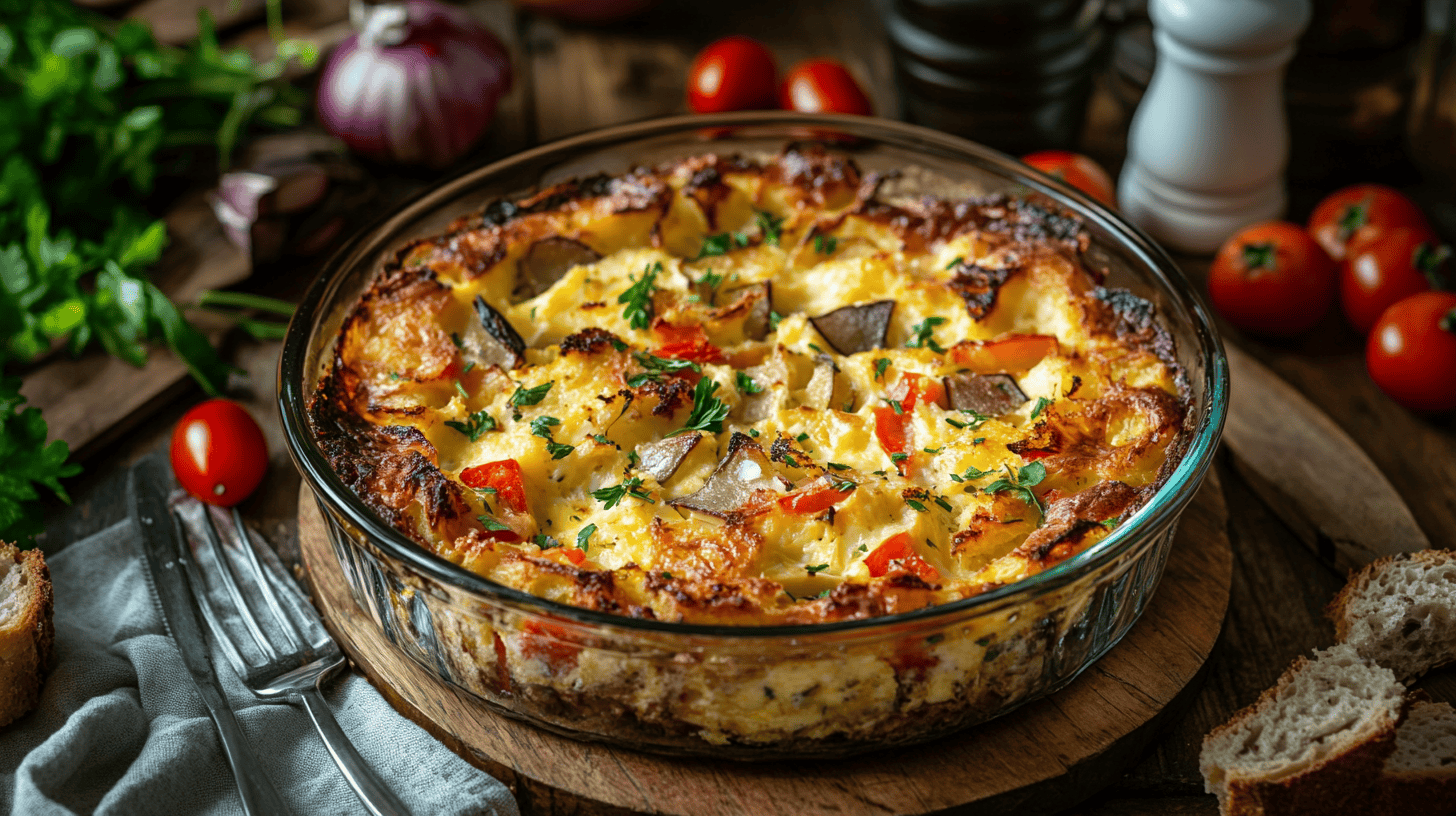Table of Contents
Egg casseroles are a go-to dish for breakfast and brunch. But have you ever wondered, why do you refrigerate egg casserole overnight? This step is essential to achieving a perfectly fluffy texture, rich flavor, and evenly baked casserole. Without overnight refrigeration, you might end up with a dish that’s dry, curdled, or unevenly cooked.
Let’s dive into exactly why refrigerating egg casserole overnight makes such a big difference and how you can get the best results every time.
Is it really necessary? Or is it just an extra step that slows down your morning routine? Well, the short answer is yes, it is necessary, and it’s all about improving texture, flavor, and ensuring even baking.
In this article, we’ll break down the why and how of refrigerating egg casserole overnight, cover common problems when skipping this step, and share tips to make sure your casserole turns out perfect every time.
The Science Behind Why You Refrigerate Egg Casserole Overnight
To truly understand why you refrigerate egg casserole overnight, it helps to know the science behind it. Eggs, bread, dairy, and other ingredients need time to settle and blend together for the best results. When you skip this step, the magic just doesn’t happen.
When you refrigerate an egg casserole overnight, several key things happen:
- Proteins Relax: The proteins in the eggs have time to break down and evenly distribute.
- Flavors Blend: Ingredients like cheese, herbs, and seasonings meld together.
- Bread Absorbs Liquid: The bread or other starches fully soak up the egg mixture, creating a fluffy and cohesive texture.
Let’s look more closely at how refrigeration affects texture and flavor.
How to Refrigerate Egg Casserole Overnight the Right Way
How Overnight Chilling Affects Egg Proteins
Eggs are the star of the show in any casserole. When you whisk eggs with milk, cream, or cheese, you’re creating a custard base. The proteins in the eggs get slightly broken down during whisking. But they need time to bond with the milk and other ingredients.
When you refrigerate the mixture overnight:
- Proteins Stabilize: The egg proteins intertwine and stabilize, leading to a smoother texture.
- Moisture Gets Locked In: The mixture doesn’t dry out, ensuring a moist and fluffy bake.
- Even Distribution: The eggs fully integrate with the other ingredients, preventing any pockets of dryness or wetness.
Skipping this step can result in a rubbery or curdled casserole. And let’s face it — no one wants rubbery eggs first thing in the morning!
Enhancing Flavor with Resting Time in the Fridge
Think of overnight refrigeration as giving your casserole time to “marinate.” During this resting period:
- Spices Bloom: Seasonings like black pepper, garlic powder, or paprika have time to spread their magic throughout the dish.
- Cheese Melts into the Mixture: Cheeses like cheddar or mozzarella soften and mingle with the eggs and milk.
- Meat and Veggie Flavors Deepen: Ingredients like sausage, bacon, onions, and peppers infuse their flavors more deeply.
Block Quote:
“Overnight refrigeration isn’t just a time delay — it’s a flavor enhancer. It’s like letting a good soup simmer for hours; the longer it rests, the better it tastes.”
The result? A casserole that’s rich, cohesive, and absolutely bursting with flavor.
Key Ingredients That Benefit from Refrigerating Egg Casserole Overnight
Some ingredients benefit more than others from a long, cold rest in the fridge. Here are the key players in your egg casserole that love a good chill:
Eggs and Dairy: The Perfect Balance
Eggs and dairy form the custard that binds the casserole together. The longer they rest, the more stable and creamy the custard becomes. Whether you use milk, heavy cream, or a mix of both, refrigeration helps the eggs and dairy blend seamlessly. 🥚🥛
Bread and Starches: Allowing Proper Absorption
If your recipe includes bread, it needs time to soak up the liquid. Bread cubes act like little sponges. Overnight, they absorb the egg mixture and soften, turning into a fluffy, custardy base when baked. 🍞✨
Without enough soaking time, the bread can stay dry or become mushy. And nobody wants a mouthful of dry bread or a soggy mess!
Table: Essential Ingredients for a Classic Egg Casserole
| Ingredient | Purpose |
|---|---|
| Eggs | Provides structure and protein |
| Milk or Cream | Adds creaminess and richness |
| Bread Cubes | Soaks up the custard, adds fluffiness |
| Cheese (Cheddar, etc.) | Adds flavor and gooey texture |
| Meat | Adds savory depth and protein |
| Vegetables (Onions, Peppers) | Adds crunch, color, and nutrients |
| Seasonings (Salt, Pepper, Herbs) | Enhances flavor |
Does Refrigeration Affect Baking Time?
Absolutely! When you take a casserole straight from the fridge to the oven, it starts out cold. This affects the baking process in a few key ways:
- Slower Heating: The casserole takes longer to warm up, allowing the eggs to set more gradually.
- Even Cooking: The cold start helps the casserole bake uniformly, from the edges to the center.
- Prevent Overcooking: Eggs cook gently, reducing the risk of a rubbery or curdled texture.
Tip: You might need to add an extra 5-10 minutes to your baking time to account for the cold start. But trust me, the result is worth it! 🕒
Common Problems When Skipping Refrigeration
We get it — sometimes, patience is hard to muster, especially when you’re hungry! But skipping the overnight chill can lead to some pretty disappointing results. Here are the most common issues and how to avoid them:
Curdled Texture and How to Avoid It
When eggs are exposed to sudden heat without enough resting time, they can curdle. This means the eggs separate into watery liquid and rubbery curds — not exactly appetizing! Refrigerating the mixture stabilizes the eggs and prevents this unpleasant outcome.
Uneven Baking and Inconsistent Results
Without resting, your ingredients might not distribute evenly. This can result in:
- Dry Edges: The outer parts bake faster and dry out.
- Soggy Center: The middle stays undercooked and wet.
- Layer Separation: The bread, eggs, and meat might not stick together properly.
Refrigeration helps everything meld together, ensuring each bite is a perfect blend of flavors and textures.
How to Properly Refrigerate Egg Casserole Overnight
Now that you know why refrigeration is important, here’s a step-by-step guide to doing it right:
Step-by-Step Guide for Chilling Your Casserole
- Assemble Your Casserole: Mix your eggs, dairy, bread, cheese, and any other ingredients.
- Grease the Dish: Lightly grease a glass or ceramic baking dish to prevent sticking.
- Pour and Cover: Pour the mixture into the dish and cover it tightly with plastic wrap or foil.
- Refrigerate: Let it rest in the fridge for at least 8 hours or overnight.
- Remove the Chill: Before baking, let the dish sit at room temperature for 20-30 minutes.
This little extra effort ensures your casserole will bake perfectly.
The Best Containers for Overnight Refrigeration
Choosing the right container for refrigerating your egg casserole overnight is crucial for achieving the best results. Not all containers are created equal, and using the wrong one can lead to uneven baking or even affect the flavor of your dish. Here are the best options:
Glass Baking Dishes
Glass baking dishes are a top choice for refrigerating and baking egg casseroles. They distribute heat evenly, which helps the casserole cook uniformly. Plus, glass won’t react with acidic ingredients like cheese or tomatoes, keeping flavors pure and delicious.
Pros of Glass Dishes:
- Even heat distribution
- Non-reactive material
- Easy to clean
Ceramic Baking Dishes
Ceramic dishes are another excellent option. They hold heat well, making them great for keeping your casserole warm after baking. They’re also stylish enough to go straight from the oven to the table.
Pros of Ceramic Dishes:
- Retains heat for longer
- Aesthetic appeal for serving
- Non-stick surfaces (with proper greasing)
Avoid Metal Pans
While metal pans might seem convenient, they can sometimes react with the eggs or dairy, altering the taste. Metal also heats up quickly, which can lead to uneven cooking.
Tips for Ensuring Perfect Egg Casserole Results
Want to guarantee that your egg casserole turns out perfectly every time? Follow these tips for prep, refrigeration, and baking:
Prepping Ingredients for Maximum Flavor
- Sauté Vegetables First: Cooking onions, peppers, mushrooms, or spinach before adding them to your casserole helps release moisture and intensifies their flavor. This prevents your casserole from becoming watery.
- Cook Meats Thoroughly: If you’re adding sausage, bacon, or ham, make sure they’re fully cooked and drained of excess grease. This keeps the casserole from getting greasy.
- Add Fresh Herbs: Sprinkle in some parsley, chives, or basil for a pop of freshness. Herbs brighten up the flavors and add color.
Optimal Baking Temperatures After Refrigeration
After refrigerating your casserole overnight, let it sit at room temperature for about 20-30 minutes before baking. This helps it bake more evenly. Preheat your oven to 350°F (175°C) and bake for 45-50 minutes. The casserole is done when:
- The edges are golden brown.
- The center is set and no longer jiggly.
- A toothpick or knife inserted into the center comes out clean.
How Long Can You Refrigerate Egg Casserole Before Baking?
You might wonder how long your egg casserole can safely sit in the fridge before baking. Here’s the general rule of thumb:
- Up to 24 Hours: Most casseroles are fine in the fridge for up to 24 hours. This is the ideal time frame for flavors to meld and ingredients to settle.
- Up to 48 Hours: If you need more time, you can push it to 48 hours. Just make sure it’s tightly covered to prevent it from drying out or absorbing other fridge odors.
Beyond 48 hours, the eggs and dairy might start to break down, leading to a less-than-ideal texture.
Is It Safe to Skip Overnight Refrigeration?
Sometimes, life gets busy, and you might not have time to chill your casserole overnight. Is it safe to skip this step? Technically, yes — but there are some trade-offs.
Food Safety Concerns and Risks
Eggs are perishable, so if you’re preparing your casserole in advance and not baking it right away, refrigeration is necessary to keep it safe to eat. Leaving an egg-based dish at room temperature for too long can invite harmful bacteria.
When a Quick Chill Might Be Sufficient
If you’re in a rush, you can let the casserole sit in the fridge for at least 1-2 hours instead of overnight. This shorter chill time allows the ingredients to settle somewhat, though the texture and flavor won’t be as developed as with a full overnight rest.
Tip: For the best results, plan ahead and give your casserole the full overnight treatment. Your taste buds will thank you!
Can You Freeze Egg Casserole Instead of Refrigerating?
Freezing is a great option if you want to prepare your egg casserole well in advance. But freezing works a little differently from refrigerating. Here’s what you need to know:
Freezing Techniques for Long-Term Storage
- Assemble the Casserole: Prepare your casserole as usual but don’t bake it.
- Wrap It Well: Use plastic wrap followed by a layer of aluminum foil to prevent freezer burn.
- Label and Freeze: Mark the date on the package and freeze for up to 2-3 months.
How Freezing Differs from Overnight Refrigeration
- Texture Changes: Freezing can sometimes affect the texture of the eggs, making them slightly watery when thawed.
- Longer Prep Time: You’ll need to thaw the casserole in the fridge for 24 hours before baking.
Tip: If you plan to freeze your casserole, consider slightly undercooking any meats or veggies to prevent them from overcooking when you bake the thawed dish.
FAQs: Why Do You Refrigerate Egg Casserole Overnight?
Why do you refrigerate egg casserole overnight?
Refrigerating overnight allows for better texture, flavor, and even baking results.
Can I skip the overnight refrigeration?
Yes, but your casserole may end up with a less fluffy texture and unevenly distributed flavors.
How long can I refrigerate the casserole before baking?
You can refrigerate it for up to 24-48 hours safely.
Does refrigerating affect baking time?
Yes, expect to add 5-10 extra minutes when starting with a cold casserole.
Why does my casserole come out watery?
This happens if you skip refrigeration or if the veggies release too much moisture. Sauté them first for better results!
Looking for more egg casserole recipes?
Check out this delicious variation: Irresistible Baked Egg Casserole with Crackers for a unique and tasty twist!
Conclusion: Why Do You Refrigerate Egg Casserole Overnight? The Secret to Success!
The question of why you refrigerate egg casserole overnight has a simple answer: it guarantees the best flavor, texture, and baking results. By allowing the eggs, bread, and other ingredients to meld and settle, you create a dish that’s worth the wait. Whether you’re serving it for a family brunch or a special occasion, this step makes all the difference.
Give it a try — your taste buds will thank you!
Print
Overnight Egg Casserole
- Total Time: 65 minutes
- Yield: 8 servings 1x
- Diet: Meat
Description
A delicious egg casserole that benefits from overnight refrigeration for optimal texture and flavor.
Ingredients
- 8 large eggs
- 2 cups milk or heavy cream
- 4 cups bread cubes
- 1 cup shredded cheese (Cheddar or mozzarella)
- 1 cup cooked sausage or bacon, crumbled
- 1 cup chopped vegetables (onions and peppers)
- 1 teaspoon salt
- 1/2 teaspoon black pepper
- 1 teaspoon dried herbs (thyme or basil)
Instructions
- In a large bowl, whisk together the eggs and milk or cream until well combined.
- Add bread cubes, cheese, sausage or bacon, vegetables, salt, pepper, and herbs. Stir to combine.
- Grease a baking dish and pour the mixture into it.
- Cover tightly with plastic wrap or foil and refrigerate for at least 8 hours or overnight.
- Before baking, let it sit at room temperature for 20-30 minutes.
- Preheat the oven to 350°F (175°C) and bake for 45-50 minutes, until the edges are golden brown and the center is set.
Notes
For best results, sauté vegetables before adding to the casserole and ensure the casserole is tightly covered while refrigerating to prevent drying out.
- Prep Time: 15 minutes
- Cook Time: 50 minutes
- Category: Breakfast
- Method: Baking
- Cuisine: American
Nutrition
- Serving Size: 1 serving
- Calories: 350
- Sugar: 5g
- Sodium: 600mg
- Fat: 20g
- Saturated Fat: 10g
- Unsaturated Fat: 8g
- Trans Fat: 0g
- Carbohydrates: 30g
- Fiber: 2g
- Protein: 15g
- Cholesterol: 300mg

